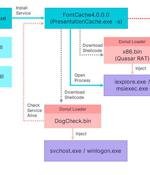Security News

The threat actors behind the HiatusRAT malware have returned from their hiatus with a new wave of reconnaissance and targeting activity aimed at Taiwan-based organizations and a U.S. military procurement system. Besides recompiling malware samples for different architectures, the artifacts are said to have been hosted on new virtual private servers, Lumen Black Lotus Labs said in a report published last week.

The rising geopolitical tensions between China and Taiwan in recent months have sparked a noticeable uptick in cyber attacks on the East Asian island country. "From malicious emails and URLs to malware, the strain between China's claim of Taiwan as part of its territory and Taiwan's maintained independence has evolved into a worrying surge in attacks," the Trellix Advanced Research Center said in a new report.

Three years from now, hypothetically, China launches an amphibious invasion of Taiwan. There's no overland route to deliver supplies to Taiwan's military - whatever it has when China invades is what it'll have until friendly forces can resupply it over the Pacific.

Public sector bans of Chinese platform TikTok on the grounds of national security have arisen in both Taiwan and additional US states following last week's ban in South Dakota. Last month, Taiwan's Mainland Affairs Council reportedly said the government has prohibited Chinese-funded corporations from operating online platforms in Taiwan and ByteDance does not operate a branch in Taiwan.

Tensions between the US, China, and Taiwan have far-reaching impacts beyond semiconductor saber-rattling and trade restrictions. NSA Director of Cybersecurity Rob Joyce has some critical lessons on how companies can withstand an escalation in China-Taiwan tensions and what such conflicts matter in the first place.

Speaker of the US House of Representatives Nancy Pelosi has tied her controversial visit to Taiwan to an alleged barrage of China-directed cyber-attacks against the territory. The column details many Chinese acts that Pelosi alleges Taiwan has had to defend - including some in cyberspace, where she accused China of "Launching scores of attacks on Taiwan government agencies each day."

Trouble is brewing over moves by Taiwan to prevent China from gaining access to its chip technology, as the island nation proposes tougher laws to deter the leaking of trade secrets outside the country. China has reportedly hit back after Taiwanese Premier Su Tseng-chang called this week for a speedier introduction of legislation designed to protect the local semiconductor industry from what it sees as Chinese industrial espionage.

Taiwan's Ministry of Justice has tasked its Investigation Bureau to conduct a series of raids around the island and hauled in 60 Chinese nationals suspected of lifting trade secrets or poaching talent from China-owned firms. "The Chinese Communist Party has made a large-scale detour to Taiwan through mainland enterprises and poached Taiwan high-tech industry talents with high salaries," explained the Investigation Bureau of the Ministry of Justice.

An advanced persistent threat group operating with objectives aligned with the Chinese government has been linked to an organized supply chain attack on Taiwan's financial sector. The second wave of attacks hit a peak between February 10 and 13, 2022, according to a new report published by Taiwanese cybersecurity firm CyCraft, which said the wide-ranging supply chain compromise specifically targeted the software systems of financial institutions, resulting in "Abnormal cases of placing orders."

Taiwan's Parliament, the Executive Yuan, yesterday revealed draft amendments to national security laws aimed at deterring and punishing Chinese economic espionage efforts directed at stealing tech industry secrets. Premier Su Tseng-chang said Taiwanese authorities have observed Chinese interests infiltrating local operations and "Utilizing various methods to lure high-tech talent from Taiwan and steal Taiwanese core technologies."